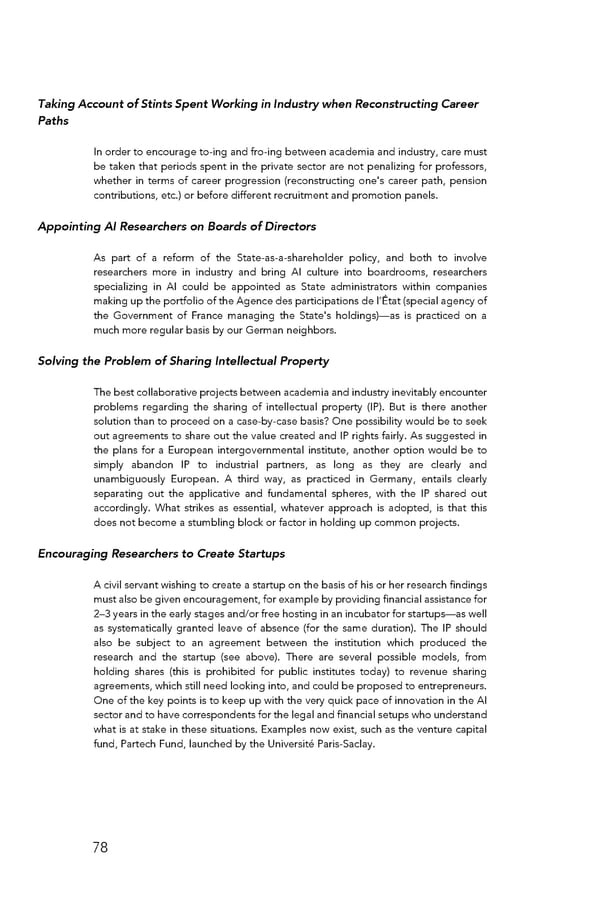Taking Account of Stints Spent Working in Industry when Reconstructing Career Paths In order to encourage to-ing and fro-ing between academia and industry, care must be taken that periods spent in the private sector are not penalizing for professors, whether in terms of career progression (reconstructing one's career path, pension contributions, etc.) or before different recruitment and promotion panels. Appointing AI Researchers on Boards of Directors As part of a reform of the State-as-a-shareholder policy, and both to involve researchers more in industry and bring AI culture into boardrooms, researchers specializing in AI could be appointed as State administrators within companies making up the portfolio of the Agence des participations de l’État (special agency of the Government of France managing the State's holdings)—as is practiced on a much more regular basis by our German neighbors. Solving the Problem of Sharing Intellectual Property The best collaborative projects between academia and industry inevitably encounter problems regarding the sharing of intellectual property (IP). But is there another solution than to proceed on a case-by-case basis? One possibility would be to seek out agreements to share out the value created and IP rights fairly. As suggested in the plans for a European intergovernmental institute, another option would be to simply abandon IP to industrial partners, as long as they are clearly and unambiguously European. A third way, as practiced in Germany, entails clearly separating out the applicative and fundamental spheres, with the IP shared out accordingly. What strikes as essential, whatever approach is adopted, is that this does not become a stumbling block or factor in holding up common projects. Encouraging Researchers to Create Startups A civil servant wishing to create a startup on the basis of his or her research findings must also be given encouragement, for example by providing financial assistance for 2–3 years in the early stages and/or free hosting in an incubator for startups—as well as systematically granted leave of absence (for the same duration). The IP should also be subject to an agreement between the institution which produced the research and the startup (see above). There are several possible models, from holding shares (this is prohibited for public institutes today) to revenue sharing agreements, which still need looking into, and could be proposed to entrepreneurs. One of the key points is to keep up with the very quick pace of innovation in the AI sector and to have correspondents for the legal and financial setups who understand what is at stake in these situations. Examples now exist, such as the venture capital fund, Partech Fund, launched by the Université Paris-Saclay. 78
 For a Meaningful AI - Report Page 78 Page 80
For a Meaningful AI - Report Page 78 Page 80